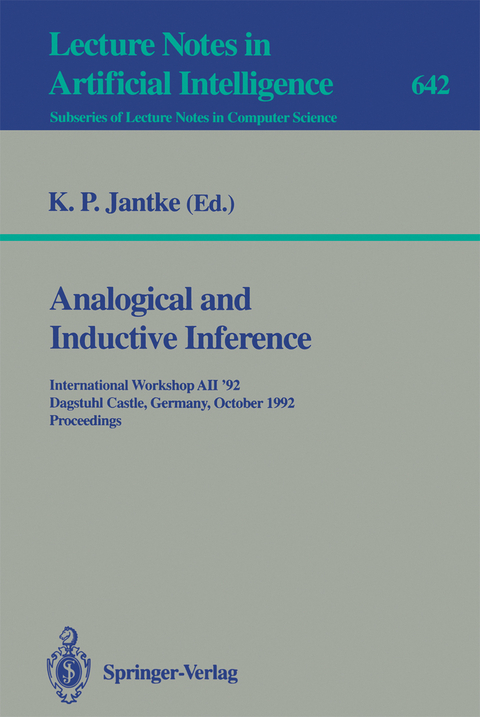
Analogical and Inductive Inference
Springer Berlin (Verlag)
978-3-540-56004-3 (ISBN)
Representing the spatial/kinematic domain and lattice computers.- A solution of the credit assignment problem in the case of learning rectangles.- Learning decision strategies with genetic algorithms.- Background knowledge and declarative bias in inductive concept learning.- Too much information can be too much for learning efficiently.- Some experiments with a learning procedure.- Unions of identifiable classes of total recursive functions.- Learning from multiple sources of inaccurate data.- Strong separation of learning classes.- Desiderata for generalization-to-N algorithms.- The power of probabilism in Popperian FINite learning.- An analysis of various forms of 'jumping to conclusions'.- An inductive inference approach to classification.- Asking questions versus verifiability.- Predictive analogy and cognition.- Learning a class of regular expressions via restricted subset queries.- A unifying approach to monotonic language learning on informant.- Characterization of finite identification.- A model of the 'redescription' process in the context of geometric proportional analogy problems.- Inductive strengthening: The effects of a simple heuristic for restricting hypothesis space search.- On identifying DNA splicing systems from examples.
| Erscheint lt. Verlag | 23.9.1992 |
|---|---|
| Reihe/Serie | Lecture Notes in Artificial Intelligence | Lecture Notes in Computer Science |
| Zusatzinfo | X, 326 p. |
| Verlagsort | Berlin |
| Sprache | englisch |
| Maße | 155 x 235 mm |
| Gewicht | 494 g |
| Themenwelt | Mathematik / Informatik ► Informatik ► Betriebssysteme / Server |
| Mathematik / Informatik ► Informatik ► Software Entwicklung | |
| Informatik ► Theorie / Studium ► Künstliche Intelligenz / Robotik | |
| Schlagworte | algorithm • Algorithmic Learning • Algorithmisches Lernen • algorithms • Analoges Schliessen • Analoges Schließen • Analogical Inference • Artificial Intelligence • Automatic Programming • Automatisches Beweisverfahren • Automatisches Programmieren • Case-Based Reasoning • cognitive science • Fall-basiertes Schliessen • Fall-basiertes Schließen • Hardcover, Softcover / Informatik, EDV/Informatik • HC/Informatik, EDV/Informatik • Inductive Inference • Induktives Schliessen • Induktives Schließen • Intelligence • Künstliche Intelligenz • learning • Logic • logical reasoning • programming |
| ISBN-10 | 3-540-56004-1 / 3540560041 |
| ISBN-13 | 978-3-540-56004-3 / 9783540560043 |
| Zustand | Neuware |
| Haben Sie eine Frage zum Produkt? |
aus dem Bereich


